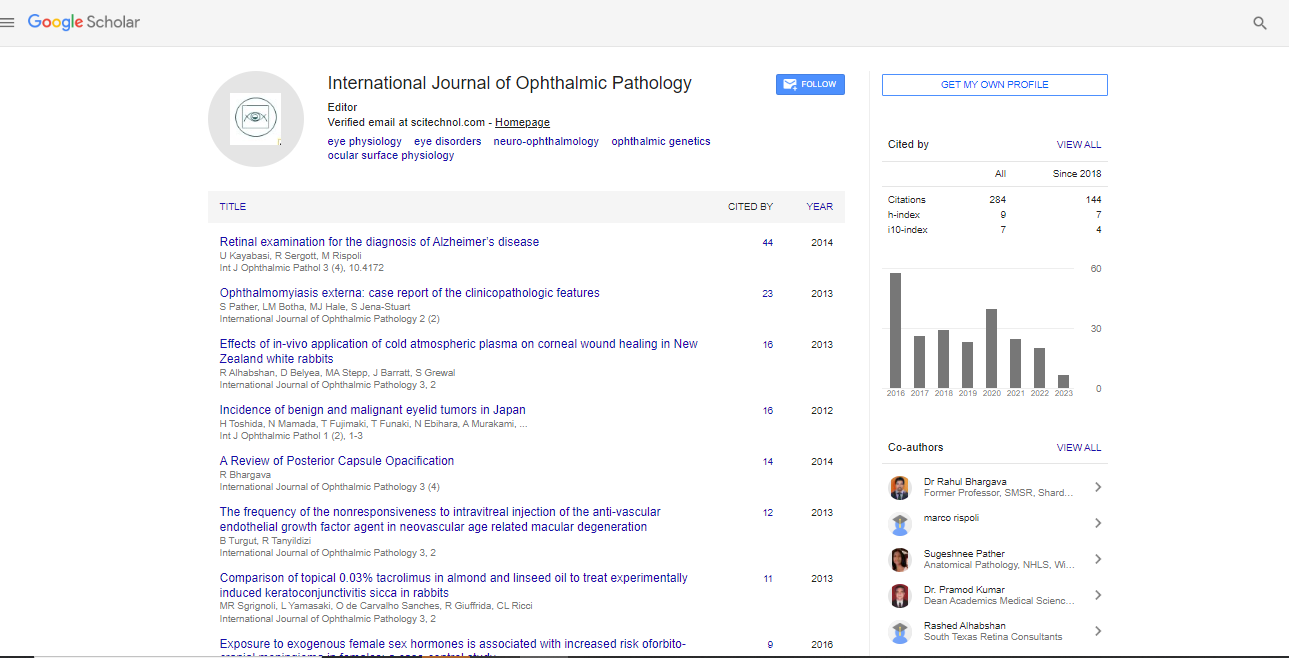Short Communication, Int J Ophthalmic Vol: 9 Issue: 3
Short note on Diabetic Retinopathy
Department of Microbiology, Andhra University, Vishakhapatnam, India
*Corresponding Author: Akhila Sabbineni
Department of Microbiology, Andhra University, Vishakhapatnam, India
E-mail: akhilasabbineni777@gmail.com
Received: July 20, 2020 Accepted: July 24, 2020 Published: July 27, 2020
Abstract
Diabetic retinopathy is an eye disease or condition that can cause vision and blindness in people who have diabetes. It also effects the blood vessels in the retina the sensitivities layer of tissue in the eyes. Diabetic patient needs to get eye check up at least once in year. At early stages diabetic retinopathy may not have any symptoms but finding it in the early stages can protect from the loss of vision. Diabetics ca n be controlled by staying physically active, eating healthy, taking medication regularly.
Keywords: Diabetic retinopathy, Diabetic macular edema, Neovascular glaucoma
Symptoms
The early stages of diabetic retinopathy usually don’t have any symptoms. Some people notice changes in their vision, like trouble reading or seeing faraway objects. These changes may come and go.
In later stages of the disease, blood vessels in the retina start to bleed into the vitreous (gel-like fluid in the centre of the eye). If this happens, you may see dark, floating spots or streaks that look like cobwebs. Sometimes, the spots clear up on their own — but it’s important to get treatment right away. Without treatment, the bleeding can happen again, get worse, or cause scarring.
Causes
Diabetic retinopathy can lead to other serious eye conditions:
Diabetic macular edema (DME). Over time, about half of people with diabetic retinopathy will develop DME. DME happens when blood vessels in the retina leak fluid, causing swelling in the macula (a part of the retina). If you have DME, your vision will become blurry because of the extra fluid in your macula.
Neovascular glaucoma. Diabetic retinopathy can cause abnormal blood vessels to grow out of the retina and block fluid from draining out of the eye. This causes a type of glaucoma.
Retinal detachment. Diabetic retinopathy can cause scars to form in the back of your eye. When the scars pull your retina away from the back of your eye, it is called tractional retinal detachment.
Diabetic retinopathy is caused by high blood sugar due to diabetes. Over time, having too much sugar in your blood can damage your retina — the part of your eye that detects light and sends signals to your brain through a nerve in the back of your eye (optic nerve).
Diabetes damages blood vessels all over the body. The damage to your eyes starts when sugar blocks the tiny blood vessels that go to your retina, causing them to leak fluid or bleed. To make up for these blocked blood vessels, your eyes then grow new blood vessels that do not work well. These new blood vessels can leak or bleed easily.
Risk Factors
Anyone with any kind of diabetes can get diabetic retinopathy — including people with type 1, type 2, and gestational diabetes (diabetes that can develop during pregnancy).
Your risk increases the longer you have diabetes. Out of 5 more than 2 Americans have some stage of diabetic retinopathy. The good news is that you can lower your risk of developing diabetic retinopathy by controlling your diabetes.
Women with diabetes who become pregnant or women who develop gestational diabetes — are at high risk for getting diabetic retinopathy. If a patient with pregnancy have diabetes, need to have a comprehensive dilated eye exam as soon as possible.
Having high blood pressure or high cholesterol along with diabetes increases your risk for diabetic retinopathy. So, controlling your blood pressure and cholesterol can also help lower your risk for vision loss.
 Spanish
Spanish  Chinese
Chinese  Russian
Russian  German
German  French
French  Japanese
Japanese  Portuguese
Portuguese  Hindi
Hindi 